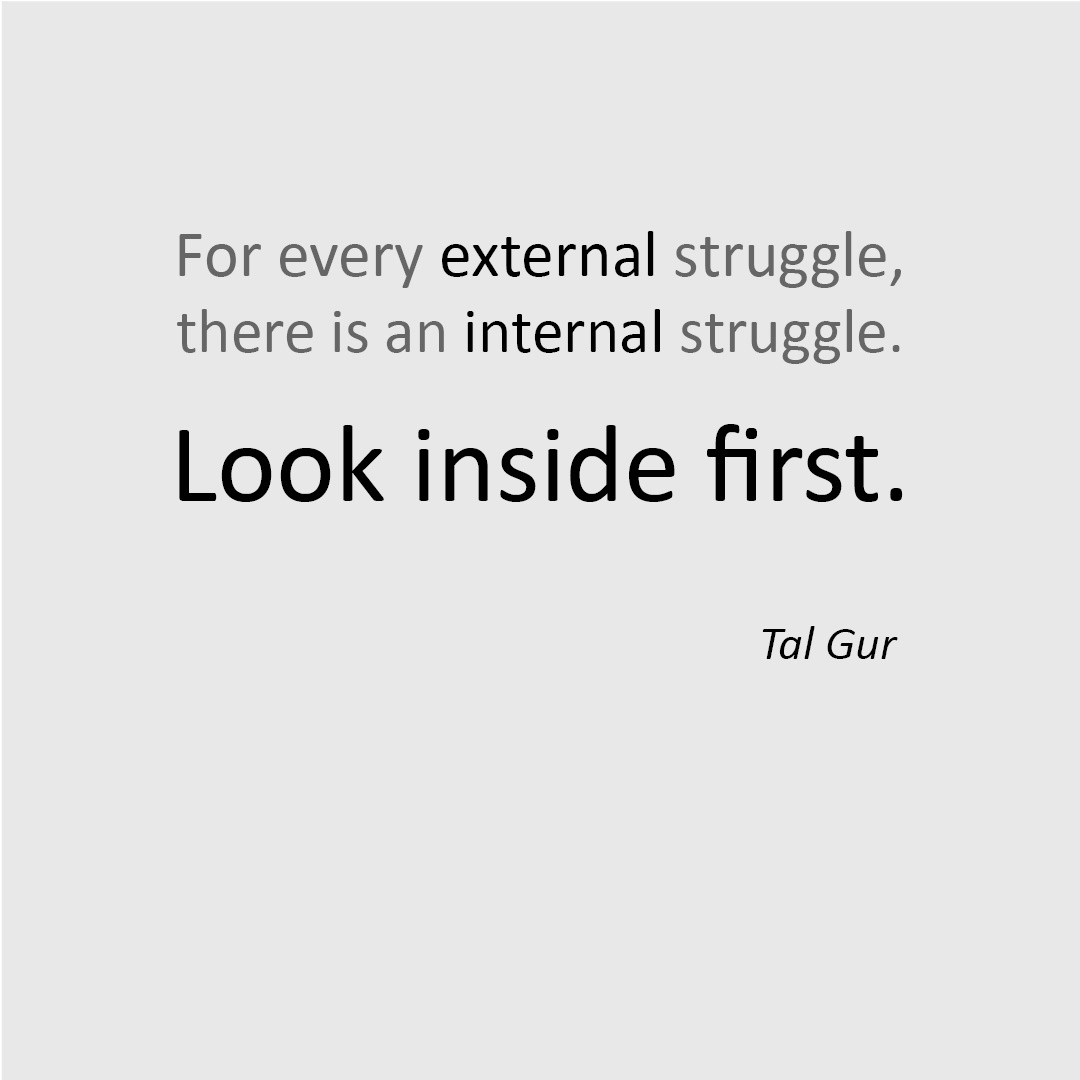For every external struggle, there is an internal struggle. Look inside first.
Life has a funny way of presenting us with challenges. It seems like we're constantly faced with external struggles, whether it's a difficult relationship, a demanding job, or a personal setback. But what if I told you that behind every external struggle lies an internal struggle? That's right, my friend. The key to overcoming these hurdles may just lie within ourselves.
Let's take a moment to delve into this idea. Often, when we face a problem or a difficult situation, our first instinct is to look outward for solutions. We seek advice from others, we blame external circumstances, and we hope that somehow, someone or something will come to our rescue. But here's the thing: the external world is often beyond our control. We can't change people or alter the course of events at will. What we can change, however, is our inner world.
When we encounter challenges, it's crucial to pause and turn our gaze inward. It's in this introspective journey that we discover our own strengths, weaknesses, fears, and aspirations. We uncover the deeply rooted beliefs and thought patterns that may be hindering our progress. It's like shining a light on the dark corners of our minds and souls, revealing the hidden motivations and barriers that contribute to our external struggles.
By looking inside first, we gain a deeper understanding of ourselves. We recognize the patterns of behavior that have kept us stuck in certain cycles. We confront our fears head-on and begin to dismantle the limiting beliefs that have held us back. It's not an easy process, mind you. It takes courage, self-reflection, and a willingness to embrace vulnerability. But the rewards are immeasurable.
As we address our internal struggles, something remarkable happens. We start to see the external challenges in a different light. We begin to understand that they are often mere reflections of our internal state. Our relationships, for instance, may mirror our unresolved issues or unmet needs. Our professional difficulties might stem from a lack of confidence or a fear of failure. By addressing these internal aspects, we gain the power to transform our external reality.
Looking inside first is about taking responsibility for our own growth and well-being. It's about recognizing that we have the power to shape our lives, regardless of the circumstances we face. It's not about denying the existence of external struggles or avoiding the necessary actions to overcome them. Rather, it's a reminder that our internal landscape plays a significant role in how we navigate the external world.
So, the next time you find yourself facing a challenge, remember to pause and turn inward. Explore your inner world, confront your fears, and question your assumptions. Embrace the opportunity for self-discovery and personal growth. By doing so, you'll not only find the strength and clarity to overcome your external struggles, but you'll also embark on a transformative journey towards a more fulfilling and empowered life.
Is there a historical example that illustrates the message of the quote?
One historical example that illustrates the message of the quote "For every external struggle, there is an internal struggle. Look inside first" is the life and teachings of Mahatma Gandhi. Gandhi was a prominent leader of the Indian independence movement against British rule in the early 20th century.
Gandhi advocated for nonviolent resistance and civil disobedience as the means to achieve freedom and justice. He believed that true change could only come from within, and that individuals must examine their own thoughts, actions, and motivations before attempting to bring about external change. Gandhi emphasized the importance of self-discipline, self-reflection, and self-transformation.
In his autobiography, "The Story of My Experiments with Truth," Gandhi described his own internal struggles and the journey of self-discovery he embarked upon. He recognized that in order to effectively challenge oppressive external forces, individuals must confront their own weaknesses, prejudices, and attachments. By doing so, they can cultivate inner strength and moral clarity, which enables them to confront external challenges with integrity and conviction.
Gandhi's philosophy of nonviolence and his emphasis on inner transformation had a profound impact on the Indian independence movement and inspired countless individuals around the world. His approach highlights the idea that addressing internal struggles and personal growth is essential for meaningful and sustainable change in any external struggle.
* To gain more inspiration and motivation for your personal growth journey, I recommend visiting my SMART goals page, which offers a wide range of goal ideas to help you establish new aspirations and achieve greater success in life. This list was crucial in the development of my own life goals list, consisting of 100 goals that I pursued for ten years.
Chief Editor
 Tal Gur is an author, founder, and impact-driven entrepreneur at heart. After trading his daily grind for a life of his own daring design, he spent a decade pursuing 100 major life goals around the globe. His journey and most recent book, The Art of Fully Living, has led him to found Elevate Society.
Tal Gur is an author, founder, and impact-driven entrepreneur at heart. After trading his daily grind for a life of his own daring design, he spent a decade pursuing 100 major life goals around the globe. His journey and most recent book, The Art of Fully Living, has led him to found Elevate Society.




















